|
|
|
Sort Order |
|
|
|
Items / Page
|
|
|
|
|
|
|
| Srl | Item |
| 1 |
ID:
080188
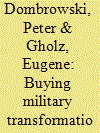

|
|
|
|
|
| Publication |
New York, Columbia University Press, 2006.
|
| Description |
xvi, 189p.
|
| Standard Number |
9780231135702
|
|
|
|
|
|
|
|
|
|
|
|
Copies: C:1/I:0,R:0,Q:0
Circulation
| Accession# | Call# | Current Location | Status | Policy | Location |
| 052993 | 355.62120973/DOM 052993 | Main | On Shelf | General | |
|
|
|
|
| 2 |
ID:
125048
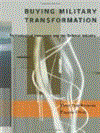

|
|
|
|
|
| Publication |
New York, Columbia University Press, 2006.
|
| Description |
xvi, 189p.Hbk
|
| Standard Number |
9780231135702
|
|
|
|
|
|
|
|
|
|
|
|
Copies: C:1/I:0,R:0,Q:0
Circulation
| Accession# | Call# | Current Location | Status | Policy | Location |
| 057510 | 355.62120973/DOM 057510 | Main | On Shelf | General | |
|
|
|
|
| 3 |
ID:
182631
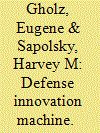

|
|
|
|
|
| Summary/Abstract |
American security policy discussions commonly warn that the United States is falling behind technologically, especially vis-à-vis China. However, the U.S. military remains at the cutting edge because of its well-developed defense innovation system. No nation (or combination) comes close to U.S. investment in defense R&D. Unmatched political concerns about avoiding casualties, inherent rivalry among participants in the U.S. defense innovation system, and traditional American openness to immigration and new ideas drive the investment. The overly alarmist warnings come from a thriving threat assessment system that continually searches for potential military dangers and technological challenges. The warnings feed the defense innovation system.
|
|
|
|
|
|
|
|
|
|
|
|
|
|
|
|
| 4 |
ID:
170919
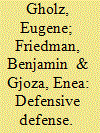

|
|
|
| 5 |
ID:
120175
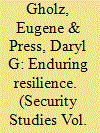

|
|
|
|
|
| Publication |
2013.
|
| Summary/Abstract |
Plentiful spare capacity persists in the oil production and tanker industries, contrary to Michael Levi's contention in his response to our earlier article, "Protecting 'The Prize.' " OPEC leaders retain excess capacity to minimize cartel members' cheating, and tanker companies retain considerable flexibility that allows them to adapt to political-military and other fluctuations in the market. Oil supplies are not on a knife-edge; exaggerated claims of energy vulnerability distort U.S. national security policy.
|
|
|
|
|
|
|
|
|
|
|
|
|
|
|
|
| 6 |
ID:
080507


|
|
|
|
|
| Publication |
2007.
|
| Summary/Abstract |
Contemporary economic globalization differs from past increases in global commerce, especially because modern foreign direct investment and systems integration techniques allow factories in different countries to specialize in the design and production of parts rather than complete products. Stephen Brooks has argued, based on both liberal and realist logics, that this new form of globalization might bring a "commercial peace," at least among the great powers. But economic globalization did not simply appear by itself. Firms and governments made conscious decisions through a process of systems integration and strategic planning that led to a wide variety of international economic relationships. That diversity of economic connections combines with the variety of strategic situations in the international environment - variations in geography, national intentions, policy history, etc. - to suggest a range of possible constraints on countries' offensive capability and on the prospects for economic gains from conquest. As has always been the case, conquest in the future will sometimes prove valuable and other times will not. Globalization does not imply the dawn of an era of commercial peace.
|
|
|
|
|
|
|
|
|
|
|
|
|
|
|
|
| 7 |
ID:
098788


|
|
|
|
|
| Publication |
2010.
|
| Summary/Abstract |
American national security policy is based on a misunderstanding about U.S. oil interests. Although oil is a vital commodity, potential supply disruptions are less worrisome than scholars, politicians, and pundits presume. This article identifies four adaptive mechanisms that together can compensate for almost all oil shocks, meaning that continuous supply to consumers will limit scarcity-induced price increases. The adaptive mechanisms are not particularly fragile and do not require tremendous foresight by either governments or economic actors. We illustrate these mechanisms at work using evidence from every major oil disruption since 1973. We then identify the small subset of disruptive events that would overwhelm these adaptive mechanisms and therefore seriously harm the United States. Finally, we analyze the utility of U.S. foreign military policy tools in addressing these threats. Our findings suggest that the United States can defend its key interests in the Persian Gulf-the world's most important oil-producing region-with a less-intrusive, "over the horizon" posture.
|
|
|
|
|
|
|
|
|
|
|
|
|
|
|
|
|
|
|
|
|